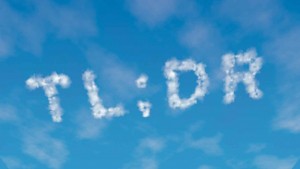Skip to content

Here’s a fascinating piece from last Sunday’s New York Times that TV producer Rob Long blogged about – Faking Cultural Literacy.
The author observes that modern media has allowed us to become a “culture of skimmers and skippers”. Thus the shorthand, TL; DR … Too Long; Didn’t Read. The article laments what this means in the realm of culture, politics and taste:
It’s never been so easy to pretend to know so much without actually knowing anything. We pick topical, relevant bits from Facebook, Twitter or emailed news alerts, and then regurgitate them. Instead of watching “Mad Men” or the Super Bowl or the Oscars or a presidential debate, you can simply scroll through someone else’s live-tweeting of it, or read the recaps the next day. Our cultural canon is becoming determined by whatever gets the most clicks.
In his 1987 book “Cultural Literacy: What Every American Needs to Know,” E. D. Hirsch Jr. listed 5,000 essential concepts and names — 1066, Babbitt, Pickwickian — that educated people should be familiar with. (Or at least that’s what I believe he wrote, not having actually read the book.) Mr. Hirsch’s book, along with its contemporary “The Closing of the American Mind” by Allan Bloom, made the point that cultural literacy — Mr. Bloom’s canon — was the bedrock of our agreed-upon values.
What we all feel now is the constant pressure to know enough, at all times, lest we be revealed as culturally illiterate. So that we can survive an elevator pitch, a business meeting, a visit to the office kitchenette, a cocktail party, so that we can post, tweet, chat, comment, text as if we have seen, read, watched, listened. What matters to us, awash in petabytes of data, is not necessarily having actually consumed this content firsthand but simply knowing that it exists — and having a position on it, being able to engage in the chatter about it. We come perilously close to performing a pastiche of knowledgeability that is really a new model of know-nothingness.
Sadly, this phenomenon not only reduces the quality of discussion and discernment in a social, cultural or political context. It reduces the quality of thinking and analysis in the business world.
Ideas catch on that aren’t fully understood or sound great without anyone hearing the important caveats or contextual limitations, and off we go trying to implement them. Companies manage by slogan and soundbyte, imitating the worst features of public culture. (See my rant on Target CMO Jeff Jones.)
Or we are mesmerized by faking co-workers. You no doubt can name some of those glib insomniacs who shame you with their attempt to consume all the information and ideas out there, only to find out later they really didn’t understand any of what they were talking about.
I just got offered a discounted deal on Business Book Summaries (Business Source) and of course my first instinct was, great, I need that! It will save time! I can get a leg up on all that great business literature, glean the big ideas (and be the smartest dude around!).
The Times’ piece brought me back to earth. There’s a reason I only read a couple of business books every year, and rarely finish more than one. They aren’t good. And I rarely learn anything that can affect results.
On the other hand, good fiction, history and biography yield much greater value. They help you understand human behavior, human motivation, and human calculation. They explain and help you understand context. They are rich with ideas that worked and ideas that failed. And of course they are vastly more entertaining and enjoyable … so much so that you don’t skip and skim.
To those of us in the strategy and competitive analysis business, while we must communicate crisply and efficiently in a time-starved world, we simply cannot afford to be know-nothings.
Share This Story, Choose Your Platform!

